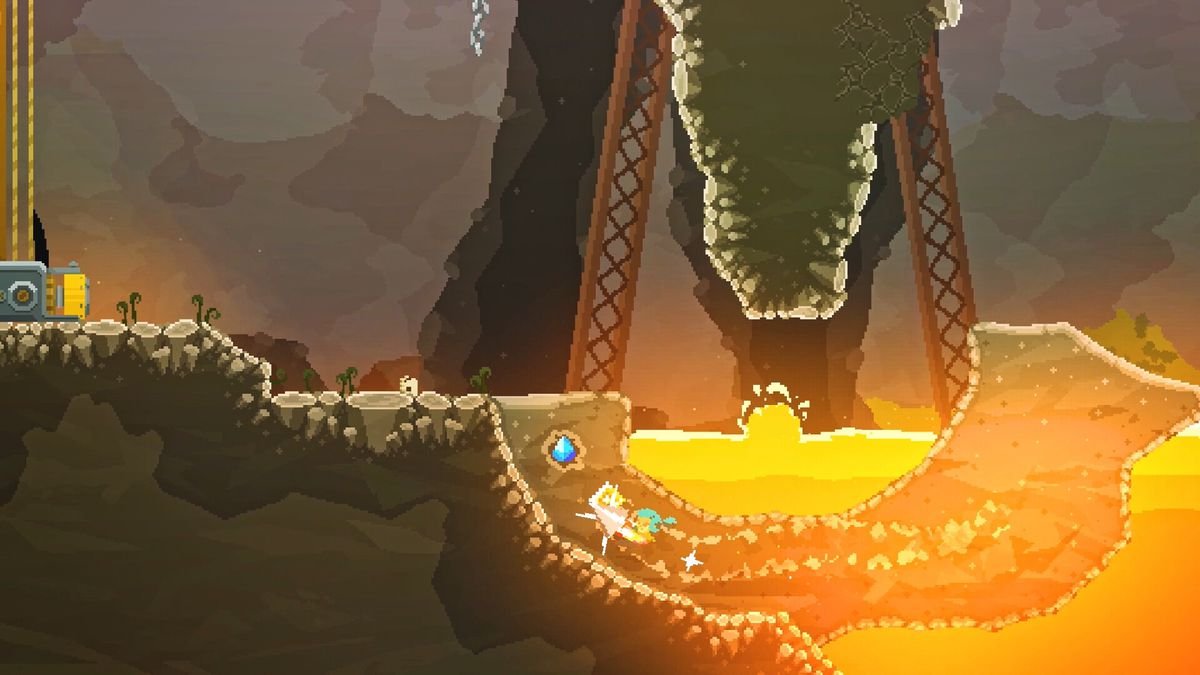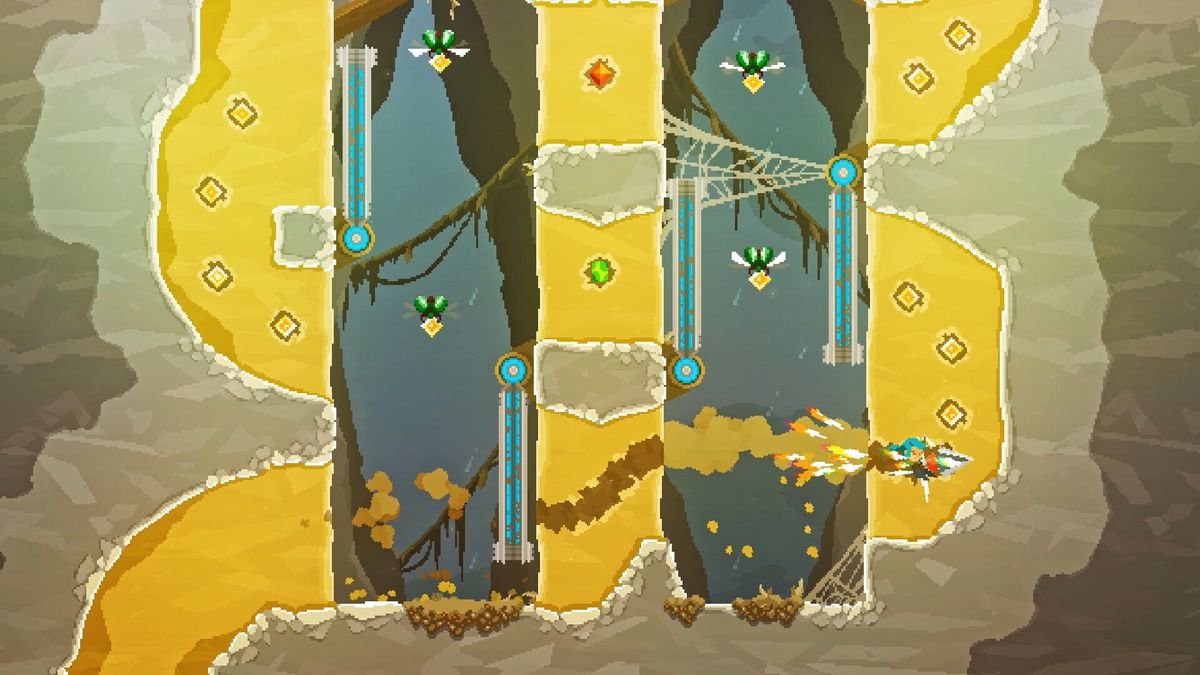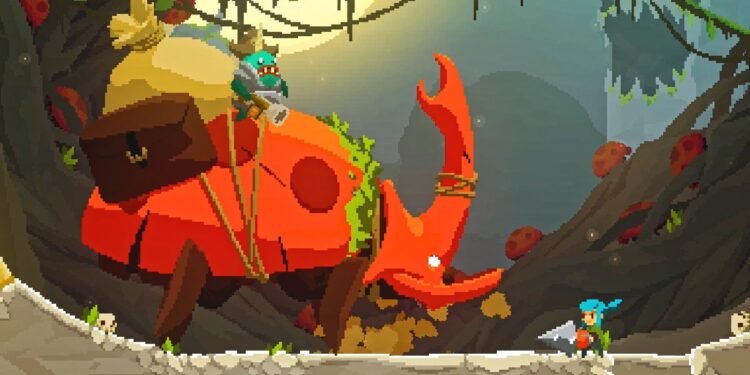Pepper Grinder doesn’t need any words. There’s no need for dialogue or instructions because what this game entails is all in the name. Shipwrecked and with her treasure stolen, Pepper’s objective is clear: Grind — literally — her way through a pirate-plagued world to get back her prize.
Pepper Grinder is a platformer with a twist. It takes a lot of traditional platforming elements like precision and timing and pairs them with the chaos of a wickedly fast drill that propels Pepper through dirt, water, and other elements. If we’re making comparisons, Pepper Grinder takes the digging from Ori and the Will of the Wisps’ Windswept Wastes levels and combines it with the fluidity of Ecco the Dolphin. What you get is a thrilling, creative game that’ll keep your nerves on edge.
Created by Ahr Ech and published by Devolver Digital, Pepper Grinder has been in development since at least 2017, when its first trailer debuted. Watching that trailer back now, it’s clear that Ahr Ech had its concept set in stone by then, and presumably spent the next seven years iterating on and polishing it. That time and dedication is immediately noticeable. Though the game takes only about four hours to beat, the levels among its four separate biomes are very detailed. Spiky vines quiver as you pass, as if they might reach out and poke you. Spindly cracks in otherwise impenetrable rocks invite Pepper’s drill, opening up secret enclaves with big, collectable coins. Radishes, farmed by moles, crunch as you plow through them, with the heart-shaped ones granting you precious health.

Image: Ahr Ech/Devolver Digital
Besides having a powerful drill, Pepper Grinder plays out like your traditional platformer: You’ll start on a map and move through its levels until you reach the boss. Somewhere on the map, you’ll find a curiosity shop where you can buy temporary health (which is dispensed through a bubblegum machine), stickers, cosmetics, or a key to one locked level per each of the four worlds using different coins found throughout the levels. None of this changes the game; you can’t buy upgrades for your drill, for instance. I used some of my coins early on to change Pepper’s hair color, then headed back to the shops only when I needed health to take on the bosses (we’ll get to that later).
The game keeps things interesting, though, by introducing and building on its ideas throughout the levels. While the first map is about getting you used to the drill and its thrust mechanic, elsewhere there’s a drill-powered cannon that you can shoot yourself out of and a hook to swing from. These aren’t exactly drill upgrades, but you do sometimes use your drill to power them. The game will change in other ways as you go. For example, Pepper is often up against narlings, which are little beans with narwhal tusks. However, these little green guys will keep evolving; at first, their tusks are the main threat, but later, they’ll have guns, knives, or extra armor. The different additions to the narlings mean they move uniquely or make it so you have to move differently. All of this together means you’ll get new challenges as you get through the levels.

Image: Ahr Ech/Devolver Digital
At the end of each map, Pepper will take on a boss. The first, as an example, is a narling with a blaster riding an oversized beetle. To defeat it you’ll have to dodge blasts from the narling and be wary of the beetle’s pointy bits, all while using your drill to deal damage and knock down its health bar. These boss battles are unforgiving and sometimes cruel in terms of their difficulty, forcing you to just deal huge amounts of damage. They’re not always particularly interesting, either, with no new mechanics — it’s largely doing the same motion or attack repeatedly. In the case of the beetle, you’re just dodging and drilling. It’s a jarring change of pace from the tough but dynamic gameplay found elsewhere in Pepper Grinder. The last boss is so frustrating that I considered giving up, leaving the game unfinished. They’re the only parts of the game that I wanted to end.
That said, the boss battles are a relatively small part of the experience of Pepper Grinder — and it’s easy to let any problems slide given how brilliant, polished, and simply fun the rest of the game is. Yes, the game can be compared to other platformers, but the way it feels to play is exhilarating in a way I haven’t felt in a while; the fluidity and speed is just so, so satisfying. Pepper Grinder is short at just four to five hours, but I found it a perfect amount of time to establish and iterate on the core mechanic without the game getting rote. For those of you who love a good platformer, you can even continue playing after rolling the credits and have a blast collecting hidden coins or taking on time trials.
Pepper Grinder was released March 28 on Mac, Nintendo Switch, and Windows PC. The game was reviewed on Windows PC on a Steam Deck using a download code provided by Devolver Digital. Vox Media has affiliate partnerships. These do not influence editorial content, though Vox Media may earn commissions for products purchased via affiliate links. You can find additional information about Polygon’s ethics policy here.















































